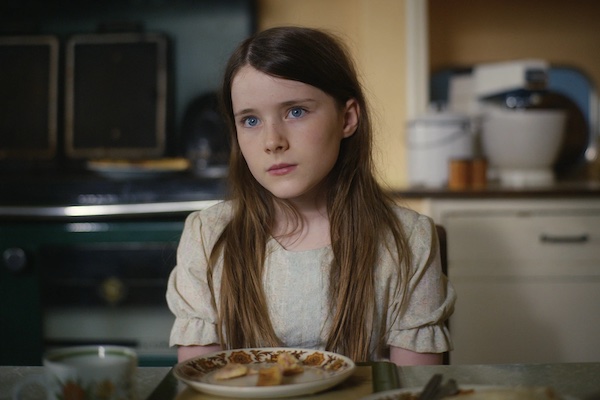Film Review: “The Quiet Girl” (An Cailín Ciúin) — Childhood Through a Glass, Softly
By Peg Aloi
The Quiet Girl is the first Irish-language nominee for the Best International Feature Oscar, and it’s not hard to see why this subdued gem of a film is capturing hearts.
The Quiet Girl, directed by Colm Bairéad. Now playing at The Coolidge Corner Theatre, Landmark Kendall Square, AMC Boston Common, and other Boston-area theaters.

Catherine Clinch in The Quiet Girl.
As its title suggests, The Quiet Girl is a film that encourages viewers to pay attention and listen carefully. Set in rural Ireland, the story follows a young girl from a large family who is sent to live with relatives during the summer when her mother is about to have a new baby. Based on Claire Keegan’s award-winning novella Foster (see Arts Fuse review), the script adaptation by director Colm Bairéad is written almost entirely in Irish, with only an occasional English idiom or pronunciation popping up in the dialogue. Given the dearth of Irish language films that draw international notice, the presence of the Irish language itself demands conscientious regard. And the praise has been generous: The Quiet Girl is the first Irish language nominee for the Best International Feature Oscar, and it’s not hard to see why this subdued gem of a film is capturing hearts.
The Quiet Girl’s protagonist, nameless in Keegan’s story, is the 12-year-old Caít, played with wondrous natural nuance by Catherine Clinch. Living in a somewhat harsh environment, with many siblings, Caít keeps to herself and appears almost painfully shy. Da (Michael Patric) drinks and lies about lazily, not working hard enough on their small farm to support the family. Mam (Kate Nic Chonaonaigh) is distracted by the stresses of poverty and domestic chaos. Soon there will be another mouth to feed. Caít mostly watches, and waits, and goes on long solitary rambles in nature, which sometimes gets her into trouble. She is teased about her strange silent ways, and her occasional bed-wetting. But Caít doesn’t seem to feel shame so much as she radiates a kind of hopeful resignation that one day something good might happen.
When her parents decide things will be less hectic if Caít goes away for a while, the event is not treated as special, or even noteworthy. It is one more chore, sloppily handled. Caít seems unaware of why she’s being driven to a distant county with barely any belongings. Dropped off at the home of her mother’s older cousin, Caít is shy but curious — she appears to be relieved to have a shift in her drab routine. Her temporary guardians, Eibhlín (Carrie Crowley) and Seán (Andrew Bennett), live in a modest farmhouse. Clean, bright, and welcoming, it is so unlike Caít’s home that she goggles with appreciation at her surroundings. Eibhlín’s face falls when she sees how neglected Caít’s appearance is: her tangled hair, dirty face, and stained dress. After a bath that seems a miracle of comfort, Caít is shown to her very own room, which includes a comfortable bed. Eibhlín seems careful not to overwhelm Caít with too much fuss, while Seán is merely polite, noticeably distant, at least at first.
Caít enjoys learning how to do basic chores from Eibhlín, and exploring the farm. Feeding the animals, hauling water from the well, and helping peel potatoes fill her with shy delight. She seems astounded that mealtime can be both relaxed and civil, not to mention a source of pleasure. A cookie offered without fanfare is like a prize. Caít comes out of her shell somewhat, coaxed by Eibhlín’s kind directives, though she still doesn’t talk much, preferring instead to observe the beautiful sights and sounds of the farm. Her solitary wandering is less an escape now and more a way to experience her surroundings with new-found joy.
A tapestry woven of both pale and bright threads, the film’s moments of loud humanity are tempered with undercurrents of languor and peace. Cinematographer Kate McCullough crafts the film’s child’s-eye perspective by way of an observant, at times uncanny, sensibility. The music, by the wonderful Stephen Rennicks (who composed scores for Frank and Room), is minimal and dreamy, mirroring Caít’s journey of awe and belonging.
As in all families, there is sadness in Eibhlín and Seán’s past, a tragic loss that explains the emptiness of their sun-filled cottage. But caring for this child, who has known so little kindness and attention — and who asks for nothing — seems like a balm that soothes the pain of the past. We see Caít’s subtle transformation and it’s hard to ignore its imprint on her, and on us as we witness it, this lesson of how quietly and deeply kindness can shape a life. And yet until its final scene, the film shows deft emotional restraint. It walks softly but decisively to a heart-stopping climax so genuine and so beautifully realized that it quite literally might take your breath away.
Peg Aloi is a former film critic for the Boston Phoenix and member of the Boston Society of Film Critics. She taught film studies in Boston for over a decade. She writes on film, TV, and culture for web publications like Time, Vice, Polygon, Bustle, Mic, Orlando Weekly, and Bloody Disgusting. Her blog “The Witching Hour” can be found on substack.

Wonderful review! Concise and beautifully written. Woke the morning after I saw it with the final image in my head and cried all over again. It’s a real gem and I’d LOVE to see it win the Oscar.